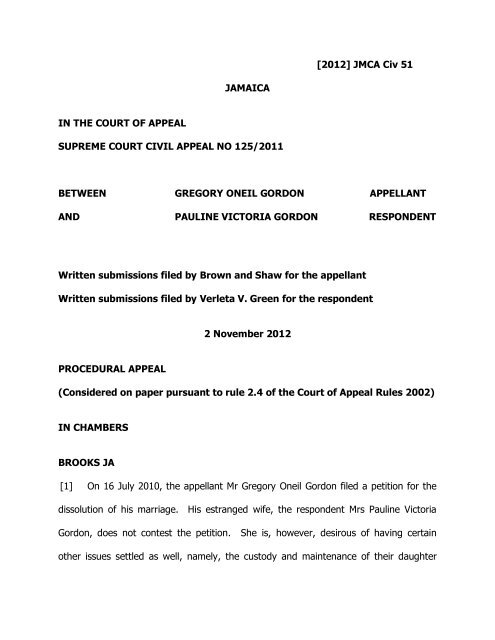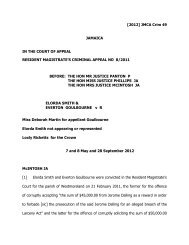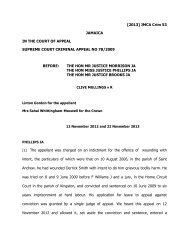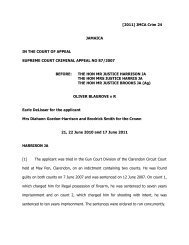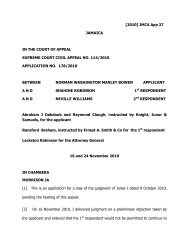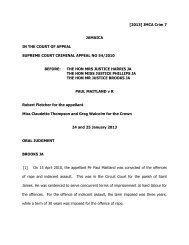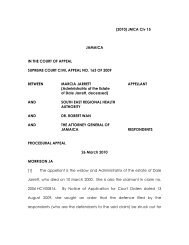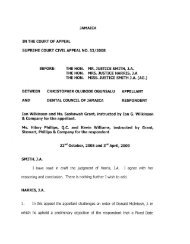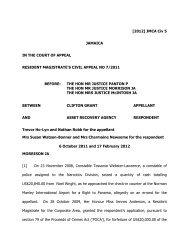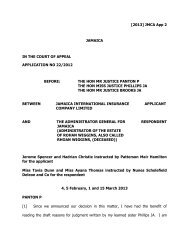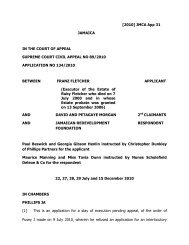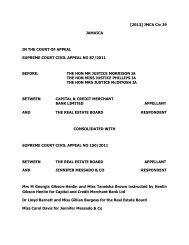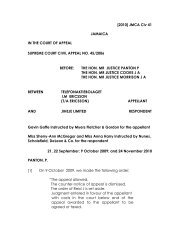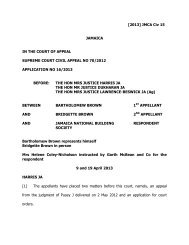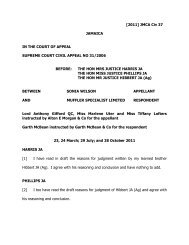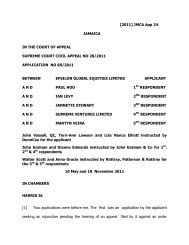(Gregory) v Gordon (Pauline).pdf - The Court of Appeal
(Gregory) v Gordon (Pauline).pdf - The Court of Appeal
(Gregory) v Gordon (Pauline).pdf - The Court of Appeal
Create successful ePaper yourself
Turn your PDF publications into a flip-book with our unique Google optimized e-Paper software.
[2012] JMCA Civ 51<br />
JAMAICA<br />
IN THE COURT OF APPEAL<br />
SUPREME COURT CIVIL APPEAL NO 125/2011<br />
BETWEEN GREGORY ONEIL GORDON APPELLANT<br />
AND PAULINE VICTORIA GORDON RESPONDENT<br />
Written submissions filed by Brown and Shaw for the appellant<br />
Written submissions filed by Verleta V. Green for the respondent<br />
2 November 2012<br />
PROCEDURAL APPEAL<br />
(Considered on paper pursuant to rule 2.4 <strong>of</strong> the <strong>Court</strong> <strong>of</strong> <strong>Appeal</strong> Rules 2002)<br />
IN CHAMBERS<br />
BROOKS JA<br />
[1] On 16 July 2010, the appellant Mr <strong>Gregory</strong> Oneil <strong>Gordon</strong> filed a petition for the<br />
dissolution <strong>of</strong> his marriage. His estranged wife, the respondent Mrs <strong>Pauline</strong> Victoria<br />
<strong>Gordon</strong>, does not contest the petition. She is, however, desirous <strong>of</strong> having certain<br />
other issues settled as well, namely, the custody and maintenance <strong>of</strong> their daughter
and the determination <strong>of</strong> their respective interests in specific real property and a<br />
business enterprise. On 14 February 2011, she filed a notice <strong>of</strong> application for court<br />
orders in respect <strong>of</strong> those issues.<br />
[2] When her application came on for hearing before Rattray J on 11 November<br />
2011, counsel for Mr <strong>Gordon</strong> argued as a preliminary point, that it was improper, in<br />
proceedings for dissolution <strong>of</strong> marriage, to apply for an order for division <strong>of</strong> property.<br />
<strong>The</strong> learned judge ruled against the preliminary point but gave permission to appeal.<br />
Mr <strong>Gordon</strong>’s appeal has come by way <strong>of</strong> a procedural appeal, pursuant to rule 2.4 <strong>of</strong><br />
the <strong>Court</strong> <strong>of</strong> <strong>Appeal</strong> Rules 2002.<br />
[3] <strong>The</strong> essence <strong>of</strong> Mr <strong>Gordon</strong>’s complaint is that issues relating to the division <strong>of</strong><br />
property may be considered in the context <strong>of</strong> a petition for dissolution <strong>of</strong> marriage, only<br />
if it is one <strong>of</strong> the forms <strong>of</strong> relief included in the petition. He contends that if it is not<br />
included in the petition, it must be initiated by way <strong>of</strong> one <strong>of</strong> the other forms <strong>of</strong><br />
originating process namely, a fixed date claim or an ordinary claim.<br />
[4] In support <strong>of</strong> this stance, learned counsel for Mr <strong>Gordon</strong>, Mrs Shaw, in her<br />
written submissions, cited rules 76.4(5) and 76.6(1) <strong>of</strong> the Civil Procedure Rules 2002<br />
(the CPR). <strong>The</strong> former states:<br />
“A petition for a decree <strong>of</strong> dissolution <strong>of</strong> marriage, for a<br />
decree <strong>of</strong> nullity <strong>of</strong> marriage or for a decree <strong>of</strong> presumption<br />
<strong>of</strong> death and dissolution <strong>of</strong> the marriage may include a<br />
claim for maintenance, custody, education <strong>of</strong> or<br />
access to children, division <strong>of</strong> property and any other<br />
relief relating to matters concerning the marriage, the union
<strong>The</strong> latter rule states:<br />
between the parties or any relevant children.” (Emphasis<br />
supplied)<br />
“Where in any petition or fixed date claim form a part<br />
<strong>of</strong> the relief claimed is custody, maintenance,<br />
education <strong>of</strong> or access to children or division <strong>of</strong><br />
property, such relief may be granted upon an application<br />
for court orders.” (Emphasis supplied)<br />
<strong>The</strong> interpretation learned counsel places on the latter provision is that it is only where<br />
the petition or fixed date claim form includes the relevant form <strong>of</strong> relief that that relief<br />
may be granted upon an application for court orders.<br />
[5] If these submissions are correct, and are taken to their logical conclusion, it<br />
would mean that only a petitioner who had included the relevant “other relief” in his<br />
petition for dissolution <strong>of</strong> marriage, could seek orders in respect <strong>of</strong> that “other relief”. A<br />
respondent, who sought such relief, would instead, have been obliged to file separate<br />
originating process. <strong>The</strong> result would be cumbersome and could well cause delay in<br />
both the conclusion <strong>of</strong> the petition as well as the application for the other relief.<br />
[6] It is well established, however, that respondents frequently, by way <strong>of</strong> ordinary<br />
application for court orders, claim relief such as custody and maintenance <strong>of</strong> the<br />
relevant children <strong>of</strong> the marriage, when these have not been included in the petition.<br />
Admittedly that practice commenced under, the now repealed, section 25 <strong>of</strong> the<br />
Matrimonial Causes Act. <strong>The</strong> practice has not abated despite the repeal <strong>of</strong> section 25<br />
by the Maintenance Act <strong>of</strong> 2005. Section 3 <strong>of</strong> the Maintenance Act allows maintenance<br />
issues to be considered alongside property issues. Section 3(2) states:
“In any case where an application is made for the division <strong>of</strong><br />
property under the Property (Rights <strong>of</strong> Spouses) Act, the<br />
<strong>Court</strong> hearing the proceedings under the Property (Rights <strong>of</strong><br />
Spouses) Act may make a maintenance order in accordance<br />
with the provisions <strong>of</strong> this Act.”<br />
Is there a difference in the approach when the issue is that <strong>of</strong> property division?<br />
[7] According to Mrs Shaw’s submission, as I understand it, section 27 <strong>of</strong> the<br />
Matrimonial Causes Act makes the difference. That section prohibits the grant <strong>of</strong> a<br />
decree absolute unless the court considers the arrangements for the care and<br />
upbringing <strong>of</strong> the relevant children. Learned counsel submitted that the established<br />
method <strong>of</strong> bringing those matters to the court’s attention is by way <strong>of</strong> an application for<br />
court orders.<br />
[8] <strong>The</strong> flaw in that argument is that neither the Matrimonial Causes Act nor the CPR<br />
stipulates any distinct procedure, for that consideration. Rules 76.4(5) and 76.6(1),<br />
which were quoted above, are the provisions which deal with the issues regarding<br />
children and the issues regarding property.<br />
<strong>The</strong>y do not discriminate between the<br />
types <strong>of</strong> relief.<br />
[9] <strong>The</strong> written submissions by Mrs Green, on behalf <strong>of</strong> Mrs <strong>Gordon</strong>, are more in line<br />
with the tenor <strong>of</strong> the overriding objective <strong>of</strong> the CPR. That objective is the dealing with<br />
cases in a manner which saves expense and ensures that they are dealt with<br />
expeditiously and fairly (rule 1.1(2)(c)). <strong>The</strong> essence <strong>of</strong> learned counsel’s submission<br />
was:
a. <strong>The</strong> petition for dissolution <strong>of</strong> marriage, having been filed, Mrs <strong>Gordon</strong><br />
was obliged to place all issues in contention, in relation to the marriage<br />
and the relevant child, before the court.<br />
b. Section 11 <strong>of</strong> the Property (Rights <strong>of</strong> Spouses) Act allows an application to<br />
the court for a decision concerning division <strong>of</strong> property, to be made “in a<br />
summary way to a Judge <strong>of</strong> the Supreme <strong>Court</strong>”.<br />
In that context<br />
“summary” means “without the formality <strong>of</strong> a full proceeding”. <strong>The</strong> use <strong>of</strong><br />
the term “summary”, contemplates this, less formal, method adopted by<br />
Mrs <strong>Gordon</strong>.<br />
c. Even if the method <strong>of</strong> proceeding were incorrect, the decided cases<br />
suggest that the application should not be struck out merely on the basis<br />
<strong>of</strong> the irregularity.<br />
[10] In support <strong>of</strong> the latter submission, learned counsel cited the cases <strong>of</strong> James<br />
Wyllie and Others v David West and Others SCCA No 120/2007 (delivered 13<br />
August 2008), Watson v Fernandes [2007] CCJ 1 (AJ) and Goodison v Goodison<br />
SCCA No 95/1994 (delivered 7 April 1995). Goodison is the authority that is closest,<br />
by way <strong>of</strong> context and subject matter, to the instant case.<br />
[11] In Goodison, a wife, in her petition for divorce, included prayers for the<br />
determination <strong>of</strong> property interests as well as for the maintenance <strong>of</strong> the relevant child<br />
<strong>of</strong> the marriage. <strong>The</strong> wife also filed a summons for ancillary relief in which she claimed<br />
relief concerning the property. <strong>The</strong> husband complained about that approach and was
successful at first instance in having the summons struck out. On appeal, this court<br />
held that the method <strong>of</strong> approach was irregular, as the Matrimonial Causes Act did not<br />
allow for applications <strong>of</strong> that nature. <strong>The</strong> correct procedure at that time was to have<br />
proceeded by originating summons pursuant to, the now repealed, section 16 <strong>of</strong> the<br />
Married Women’s Property Act.<br />
[12] Despite the irregularity, however, the appeal was allowed, as it was held that<br />
there would be no prejudice caused by the issues being heard at the same time and<br />
that it would have been simpler for that approach to have been used. <strong>The</strong> court placed<br />
reliance on the well known case <strong>of</strong> Herbert W Eldemire v Arthur W Eldemire<br />
[1990] UKPC 36; (1990) 38 WIR 234 and stressed the following dictum from that case:<br />
“In general the modern practice is to save expense without<br />
taking technical objection, unless it is necessary to do so in<br />
order to produce fairness and clarification.” (1990) 38 WIR<br />
238j – 239a).<br />
Those words are much more relevant with the advent <strong>of</strong> the CPR.<br />
[13] In Goodison, Forte JA (as he then was) also quoted, with approval, the<br />
judgement <strong>of</strong> Ormrod LJ in Ward v Ward and Greene [1980] 1 All ER 176 (note).<br />
Ormrod LJ, said, in part:<br />
“For my part, I have never understood the advantages <strong>of</strong><br />
multiplying pieces <strong>of</strong> paper intituled in particular statutes<br />
named at the head <strong>of</strong> the summons. It seems to me to be<br />
quite clear that s 17 <strong>of</strong> the 1882 [Married Women’s<br />
Property] Act gives the court power to order a sale (certainly<br />
as clarified by the Matrimonial Causes (Property and<br />
Maintenance) Act 1958) in proceedings between husband<br />
and wife in connection with property. Section 30 <strong>of</strong> the Law<br />
<strong>of</strong> Property Act 1925 gives the court power to order a sale
whether there is a trust for sale, and to my mind it cannot<br />
matter what the nature <strong>of</strong> the proceedings are; what<br />
matters is whether the circumstances are such as to bring<br />
the case within one or other <strong>of</strong> those Acts which give the<br />
necessary power to the court to order the sale. So I think<br />
it may be helpful if we were to say that it is not<br />
necessary to intitule proceedings as being under the<br />
Married Women's Property Act 1882 or the Law <strong>of</strong><br />
Property Act 1925, or to issue pro forma summonses<br />
to enable the court to exercise its powers to order a<br />
sale where the circumstances justify it under one or<br />
other <strong>of</strong> those Acts. I hope that may be a helpful<br />
observation.” (Emphasis supplied)<br />
Forte JA then went on to advocate a practical approach to the issue that was then<br />
before the court. He said, at page 13 <strong>of</strong> the judgment:<br />
“With that background, the question <strong>of</strong> whether the matter<br />
can proceed on the basis <strong>of</strong> the summons before the court,<br />
ought in my view to be approached in a practical way<br />
and with the view, if possible, <strong>of</strong> avoiding added<br />
expense which can result from surrendering to<br />
technical objections.” (Emphasis supplied)<br />
Forte JA’s tone in that quotation foreshadows that <strong>of</strong> the CPR.<br />
[14] Based on that reasoning and those authorities, it seems that the appropriate<br />
approach to the issue to be resolved, in the instant case, is that, in the absence <strong>of</strong> any<br />
prejudice to Mr <strong>Gordon</strong> or to the court, Mrs <strong>Gordon</strong>’s application may properly be heard<br />
in the context <strong>of</strong> the proceedings concerning the dissolution <strong>of</strong> the marriage. Firstly,<br />
the property dispute falls within the definition <strong>of</strong> “matrimonial proceedings” as used in<br />
part 76 <strong>of</strong> the CPR which deals with such matters.<br />
Secondly, similar to section 16 <strong>of</strong><br />
the Married Women’s Property Act, section 11(1) <strong>of</strong> the Property (Rights <strong>of</strong> Spouses)<br />
Act does not state that the application should be by an originating process. It states
that the applicant “may apply by summons or otherwise in a summary way to a judge<br />
<strong>of</strong> the Supreme <strong>Court</strong>”. That formulation does accommodate the use <strong>of</strong> originating<br />
process but does not preclude an application made in the context <strong>of</strong> other matrimonial<br />
proceedings.<br />
[15] In the circumstances, Mr <strong>Gordon</strong> not having shown that he would be prejudiced<br />
in any way by Mrs <strong>Gordon</strong>’s application, the appeal should be dismissed and costs<br />
awarded to Mrs <strong>Gordon</strong>. Such costs are to be taxed if not agreed.<br />
Order<br />
[16] (1) <strong>The</strong> appeal is dismissed.<br />
(2) <strong>The</strong> order <strong>of</strong> Rattray J made on 11 November 2011 is affirmed.<br />
(3) <strong>The</strong> costs <strong>of</strong> the procedural appeal are to be borne by the appellant. Such<br />
costs are to be taxed if not agreed.


